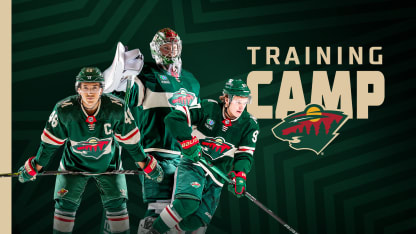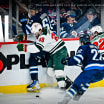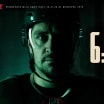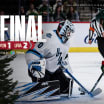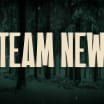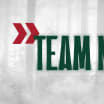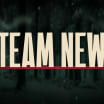Q&A with Coach
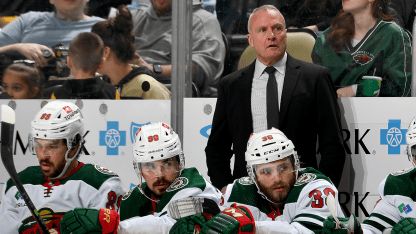
Before we get to our conversation with Minnesota Wild Head Coach Dean Evason let’s go back to a conversation I had with Evason’s former teammate (and roommate) Ray Ferraro.
Ferraro and I chatted last spring before the start of the Wild’s first-round playoff series against Dallas. What struck me about the conversation is as relevant today as the Wild begin their first steps towards the 2023-24 season as it was then.
Ferraro described how Evason was a top scorer in junior hockey – he scored 71 goals one year with Kamloops of the Western Hockey League – but when he broke into the NHL with the Hartford Whalers, the coaches there wanted him to be more of a defensive player.
Like turning a page in a book, Evason became what he needed to become.
“He became a diligent, aggressive, on top of it two way centerman. He was able to adapt his vision of the game into what he needed it to be,” Ferraro said.
“Everything he did was straight ahead,” the long-time NHL player and accomplished national analyst added. He recalled playing tennis with Evason and rallies that would last forever because neither would give up.
“I just think it’s an extension of everything he does,” Ferraro said.
Before hitting the links in the annual Wild Foundation golf outing on Monday, Evason sat down with Wild.com to chat about why taking a break is critical and plans for pushing the Wild forward in the coming season.
Scott Burnside: Tell me about your summer. Where did you go, what did you do?
Dean Evason: I just bounced around with visiting my kids. They’re all across Canada. I live in Montreal in the summer, I married a girl from there, so I’ve had a place there or we’ve had a place there for 10 years I guess. So, I come back and forth there, here, kids are all across Canada; Winnipeg, Victoria, Lethbridge. Other than that I do a lot of golfing, do a lot of traveling. My wife and I. She’s a flight attendant so we fly around as much as we can in the summer so it’s been fantastic.
SB: I always think it’s interesting with players, some never leave the ice during the summer while others take a break from it. Do you take a break from hockey, thinking about it? Are you able to put it aside when you’re doing these trips?
DE: Honestly, yes. I’m a big believer in even in-season getting away and mentally recharging. Get refreshed, come back to the rink. It’s always in the back of your mind and you’ll be doing something and obviously it’ll come back to what you can do and you’re putting your line combinations and all that kind of stuff together. I think it’s refreshing to get away. I encourage our players. I certainly encourage the coaches to do it. We don’t stay in the office all day. I think that’s counterproductive. We are there real early in the morning. We obviously work through practice and then lunch and then we get out of there. Everybody’s got family or other interests and get out of there and get recharged. We all have our computers. You can work at home if you want to bang off a couple of clips for the next day. You don’t have to sit in the office and do that. So I encourage our group to do that. And the players as well. I do that as well.
SB: What’s your relationship with the coaching staff during the summer? Do you get together? Or is it a complete break so you can totally recharge?
DE: It’s literally a complete break until development camp. Development camp is where we start putting our structure together. At the end of the season we sat down because it was fresh. We talked about systematically what we’d like to change, negatives, positives, different things that we want to improve on obviously. And then we hit development camp and we revisit. We revisit what we’ve talked about and because it was so fresh guys have had time to think and work through some stuff. Change some stuff. And then at development camp, which was nice this year because Jason King was already hired (as an assistant to replace Brett McLean who took over as head coach in Iowa with the Wild’s American Hockey League affiliate) so we were able to get in there at development camp and get our roles defined. Get our videos. Not our practice plans because we didn’t do that until we get here (later in the summer). But we’re able to just really dial in our structure of what we want to do through training camp and then when we get back here same thing. Then you do it once more just to refine it. Now we watch our videos. Two days ago we presented all our videos that we’re going to present to the team we presented to Billy (Wild GM Bill Guerin) and his staff, all the scouts, so that they get to see how we want to play. That’s Billy’s suggestion. He’s like, geez, it would be great for all of our staffs, scouts included, this is how the Minnesota Wild play the game and that’s how we want to play so they have an idea of how our group wants to conduct themselves on the ice.
SB: That must be good for you guys, too. You know what you want to say but to have an audience that wants to learn as well.
DE: One, it’s a trial run for us to go through. Two, we have a guy in Billy Guerin who’s won (four) Stanley Cups in various roles. Now, he can question, the scouts can question. There’s not a lot of questions but Billy does. Why are we forechecking like this? Or maybe he’s got an idea of something else. Our communication is fantastic through the season and it’s fantastic in general and we want his input. I know a lot of coaches that’ll be like ‘the GMs can’t come in and the owners can’t come in’. I go ‘why?’ We might as well all have some input. We’re all trying to accomplish the same thing. We’re trying to win the Stanley Cup. If we can gather information from everybody, and certainly a guy like Billy, we’re going to do it.
SB: What sort of things do you want to change/ and what sort of things do you want this team to do differently?
DE: Without going into specifics, obviously we’ve made some tweaks on our special teams that were real good through the regular season. They failed us in the playoffs. Both of them. We have to be better in that area so we’ve tweaked some different systematic stuff. How we approach the group, obviously Billy’s brought in a guy like Pat Maroon to give us that Stanley Cup pedigree and that presence in the room. That type of a guy. We’ve talked about a few different things that we are going to play with, tweak a little bit so that we’re in a position. But honestly the biggest thing that we took out of it, and it’s not an excuse because everybody goes through it, but if we could stay healthy we believe that we have as good a chance as anybody to win the Stanley Cup. You look at a team like Florida that doesn’t have a great regular season and they get in and they have an opportunity to win the Stanley Cup. They stayed healthy likely until the end and then they didn’t, right? Las Vegas stayed healthy completely right through (the playoffs). If you look at their group, their group didn’t change. Obviously they got (Mark) Stone back and they got some people back. Would we have liked to have our full group to play against the Dallas Stars? Yeah. But that’s out of our control. So we think the way that we play the game, how we play the game, with the energy, with the excitement, with the offense and defense, how we play, we think we’re in good shape to compete for a Stanley Cup.
SB: What's the anticipation like for you to get back at it?
DE: It’s exciting because it literally ramps up. You go from development camp you get a little taste of hockey again but it’s really just the kids coming. Then you get here and the rookie camp and it just ramps up. The game yesterday was fantastic. Our guys competed their asses off. And we’ve now got our systems and we’re in there and our videos and all that set up, practice plans and now it’s just an opportunity. Now we’re waiting for the real stuff to happen. It’s extremely exciting. I’ve talked to a lot of people about my job in particular and even the assistant coaches, there’s only 32 jobs so we’re very fortunate, we don’t take it for granted and we work our asses off to try and win hockey games.
SB: Do you feel the pressure? We talk about players feeling a certain amount of pressure, what the expectations are for them. It comes with the territory, but you just mentioned it, one of 32 jobs in the world, do you feel the pressure? Do you embrace it?
DE: I don’t honestly. I love the butterflies. I love the excitement level just before a game. And I don’t want to say pressure because I control what I can control as a head coach. Our coaching staff controls what we can control. We try to give the players the best opportunity to go out there and compete and play the game and I might have a little different perspective as an ex-player that I get that the coaching staff can dial in everything, we can make our adjustments and give our little tweaks, but at the end of the day we got to give the players the best opportunity to go out and win hockey games each and every night. But it is fun to tweak different things as far as how we deal with each individual. And that’s a huge part of coaching today. Coaches can put a system together and the players will buy into that system. But now it’s trying to get the best out of each individual. So there’s a lot of stuff as far as how you deal with individuals. Some you have to boot. Some you have to pat on the back. Just different ways to get the best out of each individual.
SB: Have you had to learn that over your time as a coach?
DE: I honestly don’t think so. Even when I had my first coaching job in Kamloops in juniors you’re still dealing with individuals and even though they were younger you’re still trying to figure out what the best way to get this guy to be a team player or this guy to work a little harder or this guy to get a little more confident, for this to guy to get a little less cocky. You have to always figure that out. Our staff is fantastic about that. Darby (Hendrickson) and Woody (Bob Woods) and Freddie Chabot and now Jason King. The guys do a great job. It’s not just the head coach that does that. It’s on a daily constant we should talk to this player because he seems to have lost his confidence a little bit. How do we get that back? What do we say to him? What do we do with him? How do we deal with him to get the best out of him?

